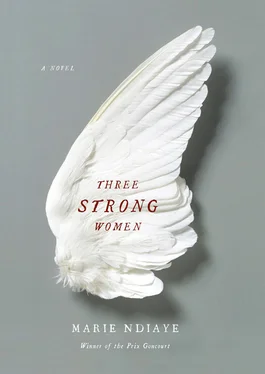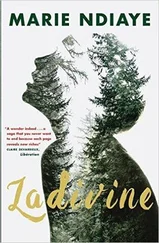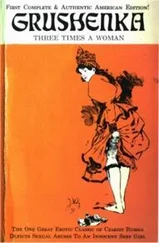He’d stood on tiptoe to sniff the flowers, deeply moved, enchanted by so much beauty and fragrance offered free of charge, and he’d then congratulated Madame Menotti on the luxuriance of her wisteria, which reminded him, he said — oh yes, he, who never spoke of his past life, had let that slip — of the frangipani blossoms in Dara Salam.
He’d seen Madame Menotti purse her lips in a mixture of skepticism and vague annoyance — just like, he’d said to himself, a mother who had favorites being complimented on the child she didn’t care for.
In a tone of dry condescension she’d complained about having to sweep up the leaves in autumn: so much dead foliage, so many shriveled petals.
She’d shown Rudy how, at the corner of the house, she’d already dealt with an enormous bignonia that had had the nerve to let its wild tangle of orange flowers climb all over the gray roughcast walls.
The slender branches, the glossy leaves, the strong roots, the dead corollas, all that lay on the ground waiting to be thrown on the bonfire, and Madame Menotti, as the heroine of a battle she’d won hands down, had pointed to it proudly and scornfully.
Crestfallen, Rudy had followed her in a tour around the garden. There was nothing but the pathetic remnants of a struggle that had been as absurd, as ferocious, as it had been reckless.
Madame Menotti wanted to clean everything up, make the place tidy, and lay down a lawn. In a destructive frenzy she’d taken it out on the hornbeam hedge (scalped), on the old walnut tree (sawn off at the root), and on the many rosebushes (dug up). After thinking better of it, she’d replanted the rosebushes elsewhere; now they were dying.
Madame Menotti still pressed on, satisfied that her acts of vandalism had established her proprietary rights. Seeing her fat bottom wobble as she moved between two piles of hundred-year-old box that she’d uprooted, Rudy had felt that, for her, it was as if nothing better demonstrated her omnipotence than the destruction of patient labors, of the memorials to the delicate, simple taste of all those numberless ghosts who had preceded her in that house and who had planted, sown, and arranged the vegetation in the garden.
And he was now discovering that Madame Menotti had cut down the wisteria.
He wasn’t surprised. He was devastated.
The little house stood there, austere, stripped bare, sadly reduced to the mediocrity, which the leaves had concealed, of the materials used in building it.
Of the magnificent plant only a short stump remained.
Rudy walked slowly toward the garden gate.
He looked at the bare facade and sobbed.
Madame Menotti had opened her door when she heard the car approaching. She found Rudy standing at the gate, his cheeks wet with tears.
She was wearing a purple tracksuit.
She had short gray hair and glasses with thick black plastic frames that made her look perpetually cross. When she took them off, Rudy had already noticed, her face was that of a helpless, lost woman.
“You’d no right to do that!” he cried.
“Do what?” Madame Menotti looked exasperated.
Then he felt in his mouth again that taste of iron, that vague taste of blood that welled up in his throat whenever he thought of Madame Menotti and of what he still had to do despite all he’d already done and that for some obscure reason, perhaps out of weariness, he’d failed to do and then forgotten about.
He now recalled only the lapse, not what the lapse had involved.
“The wisteria!” he exclaimed. “It wasn’t yours!”
“It wasn’t mine?” Madame Menotti shouted.
“It belonged … to itself, to everybody.”
His words were distorted and his voice faded away in embarrassment as he realized how futile his protest was.
It was too late, too late, in any case.
Should he not have attempted to save such an admirable wisteria?
How could he have imagined that Madame Menotti would spare it?
Once he’d witnessed her brutality toward a nature that in her eyes represented the enemy, the threat of invasion, how could he have turned his back on the wisteria, whose death sentence had been pronounced the moment she’d alluded sharply to the chore of sweeping up dead leaves?
He opened the gate and climbed up a few steps to her door.
The house now stood isolated in the middle of its grassy plot. The sun beat down on Madame Menotti.
The wisteria had given gentle shade to this same terrace, to these same concrete steps, recalled Rudy, grief stricken, and hadn’t there also been, in the corner, a large bay tree that smelled of spices in the warm air?
Gone, the bay tree, like everything else.
“Monsieur Descas, you’re an incompetent, you’re a monster.”
His eyes still damp with tears, but indifferent to what she might be thinking (it was as if shame could no longer reach him, however hard it tried), he met Madame Menotti’s scandalized gaze.
He realized that she had gone well beyond the point of indignation, that she was now close to despair, to a sort of intoxication, wandering in a gray zone in which the slightest hitch must seem to her like a deliberate act of aggression.
He realized too that she was absolutely sincere, in her way.
A vague feeling of pity was now vying with a sense of grievance inside him. He suddenly felt downcast and very tired.
Once again his anus was itching painfully. Thinking with weary diffidence about the demise of the wisteria and without a thought for Madame Menotti’s modesty or his own, he scratched himself fiercely, vigorously, through the thickness of his jeans.
Madame Menotti appeared not to notice.
She now seemed to hesitate between the need to bring him in (he was getting an inkling as to the nature of the problem, what she held against him) and an almost equally strong desire never to have anything to do with him again.
Finally she turned on her heels and gestured to him brusquely to follow her.
She was so upset, he could see her shoulders quivering.
It was the first time he’d been back to the house since he’d come to measure for the kitchen several months earlier.
Then, as he crossed the hall and the dining room behind her, a painful process of realization began. He felt an icy grip in the pit of his stomach as the dimensions of the problem became clearer to him. Then the brutal truth hit him.
He stopped in the kitchen doorway.
Horror-struck, he had difficulty restraining a hysterical fit of the giggles.
Without realizing it he started scratching himself frantically while Madame Menotti flopped onto a chair that was still wrapped in plastic.
She kept savagely pushing her glasses up her nose, to no purpose.
Her knee was quivering uncontrollably.
“Oh my God, oh my God,” Rudy blurted out.
He felt himself blushing furiously with humiliation.
How, after so much hard work, had he managed to get his arithmetic so badly wrong?
He knew he wasn’t very good at it, but when it came to designing the kind of kitchens he despised he’d secretly taken pride in his deficiencies, so much so that his arrogance had kept him from achieving any notable improvement in his skills.
He simply didn’t wish to be good at the job.
It had seemed to him that his stubbornness was a bulwark against the complete disintegration of the erudition acquired in his former life: those arcane, those subtle bits of knowledge that he’d not had the strength, courage, or desire to cultivate and sustain and that were gradually losing their preciseness and substance.
But such an error was merely ridiculous, pitiful, and in no way a credit to the refined man he considered himself to have been; no, in no way, he thought, aghast.
He moved forward cautiously.
His eyes met Madame Menotti’s and he remembered the wisteria. Still bearing the grudge, he looked away. Madame Menotti’s gaze would now have appeared drained of the scandalized hatred he’d seen earlier, but he refused to meet it, thinking, I refuse to communicate with her, if that’s what she expects.
Читать дальше












